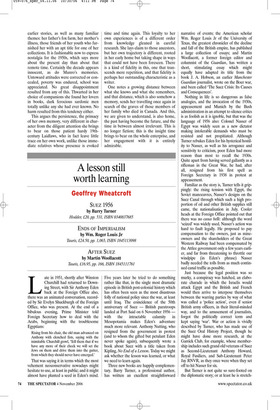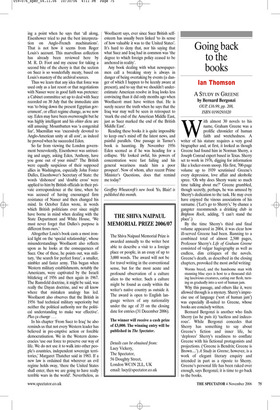A lesson still worth learning
Geoffrey Wheatcroft
SUEZ 1956 by Barry Turner Hodder, £20, pp. 531, ISBN 0340837685 ENDS OF IMPERIALISM by Wm. Roger Louis Jr Tauris, £24.50, pp. 1,065, ISBN 1845113098 AFTER SUEZ by Martin Woollacott Tauris, £16.95, pp. 166, ISBN 1845111761 Late in 1951, shortly after Winston Churchill had returned to Downing Street, with Sir Anthony Eden back at the Foreign Office also, there was an animated conversation, recorded by Sir Evelyn Shuckburgh of the Foreign Office, who was present. At the end of a bibulous evening, Prime Minister told Foreign Secretary how to deal with the Arabs, beginning with the troublesome Egyptians:
Rising from his chair, the old man advanced on Anthony with clenched fists, saying with the inimitable Churchill growl, ‘Tell them that if we have any more of their cheek we will set the Jews on them and drive them into the gutter, from which they should never have emerged.’
That was saying it in terms which the most vehement neoconservative nowadays might hesitate to use, at least in public; and it might almost have planted a seed in Eden’s mind. Five years later he tried to do something rather like that, in the single most dramatic episode in British post-colonial history which has often been seen as the most disastrous folly of national policy since the war, at least until Iraq. The coincidence of the 50th anniversary of Suez — British paratroops landed at Port Said on 6 November 1956 with the intractable calamity in Mesopotamia makes Eden’s adventure much more relevant. Anthony Nutting, who resigned from the government in protest (and to whom the gifted but petulant Eden never spoke again), subsequently wrote a book about Suez with a title taken from Kipling, No End of a Lesson. Today we might ask whether the lesson was learned, or what we need to learn again.
Three new books are happily complementary. Barry Turner, a professional author, has written an excellent straightforward narrative of events; the American scholar Wm. Roger Louis Jr of the University of Texas, the greatest chronicler of the decline and fall of the British empire, has published a large collection of essays; and Martin Woollacott, a former foreign editor and columnist of the Guardian, has written a short, stimulating essay which might equally have adapted its title from the book J. A. Hobson, an earlier Manchester Guardian journalist, wrote on the Boer war, and been called ‘The Suez Crisis: Its Causes and Consequences’.
Nothing in life is so dangerous as false analogies, and the invocation of the 1930s, appeasement and Munich by the Bush administration in an attempt to silence critics is as foolish as it is ignoble, but that was the language of 1956 also: Colonel Nasser of Egypt was widely seen as a new dictator making intolerable demands who must be resisted and not propitiated. Although Turner rebukes Eden for his hysterical hostility to Nasser, as well as his arrogance and sensitivity to criticism, poor Eden had more reason than most to recall the 1930s. Quite apart from having served gallantly as a rifleman in the Great War, he had, after all, resigned from his first spell as Foreign Secretary in 1938 in protest at appeasement.
Familiar as the story is, Turner tells it grippingly: the rising tension with Egypt, the Soviet manoeuvres, Nasser’s designs on the Suez Canal through which such a high proportion of oil and other British supplies still came, the nationalisation in July. Cooler heads at the Foreign Office pointed out that there was no casus belli: although the word ‘seized’ was widely used, Nasser’s action was hard to fault legally. He proposed to pay compensation to the owners, just as mineowners and the shareholders of the Great Western Railway had been compensated by the Attlee government only a few years earlier, and far from threatening to throttle our windpipe (in Eden’s phrase) Nasser badly needed the tolls from as much continued canal traffic as possible.
Just because the legal position was so murky, a conspiracy was hatched, an elaborate charade in which the Israelis would attack Egypt and the British and French would then arrive to interpose themselves between the warring parties by way of what was called a ‘police action’, even if senior British army officers, in their literal-minded way, and to the amusement of journalists, forgot the politically correct term and kept saying ‘war’. War or action is vividly described by Turner, who has made use of the Suez Oral History Project, though he might have done more research, at the Garrick Club, for example, whose membership includes such grand old veterans of Suez as Second-Lieutenant Anthony Howard, Royal Fusiliers, and Sub-Lieutenant Peter Jay RNVR, as they once were when they set off to hit Nasser for six.
But Turner is not quite so sure-footed on the diplomatic story; or at least he is stretch ing a point when he says that ‘all along, Eisenhower tried to put the best interpretation on Anglo-French machinations’. That is not how it seems from Roger Louis’s account. This marvellous collection has already been reviewed here by M. R. D. Foot and my excuse for taking a second bite of the cherry is that the section on Suez is so wonderfully meaty, based on Louis’s mastery of the archival sources.
Thus we learn that any idea that force was used only as a last resort or that negotiations with Nasser were in good faith was pretence: a Cabinet committee set up to deal with Suez recorded on 30 July that the immediate aim was ‘to bring down the present Egyptian government’, or effect regime change, as we now say. Eden may have been overwrought but he was highly intelligent and his obiter dicta are still amusing: Mountbatten was ‘a congenital liar’, Macmillan was ‘excessively devoted to Anglo-American unity at all cost’, as indeed he proved when he succeeded Eden.
So far from viewing the London government benevolently, Eisenhower was untrusting and angry, asking Eden, ‘Anthony, have you gone out of your mind?’ The British were equally suspicious of their supposed allies in Washington, especially John Foster Dulles, Eisenhower’s Secretary of State: the words ‘dishonest’ and ‘double cross’ were applied to him by British officials in their private correspondence at the time, when he was accused of having encouraged firm resistance of Nasser and then changed his mind. In October Eden wrote, in words which British politicians ever since might have borne in mind when dealing with the State Department and White House, ‘We must never forget that Dulles’s purpose is different from ours.’ Altogether Louis’s book casts a most ironical light on the ‘special relationship’, whose misunderstandings Woollacott also reflects upon as he looks at the consequences of Suez. One of these, he points out, was military, ‘the search for perfect force’, a smaller, nimbler and faster army. This began when Western military establishments, notably the Americans, were captivated by the Israeli blitzkrieg of 1956 and then again in 1967. The Rumsfeld doctrine, it might be said, was really the Dayan doctrine, and we all know where that mistaken analogy has led. Woollacott also observes that the British in 1956 ‘had technical military superiority but neither the political authority nor the political understanding to make war effective’. Plus Va change . . .
In his chapter ‘From Suez to Iraq’ he also reminds us that not every Western leader has believed in pre-emptive action or forcible democratisation. We in the Western democracies ‘use our force to preserve our way of life. We do not use it to walk into other people’s countries, independent sovereign territories,’ Margaret Thatcher said in 1983. If a new law is ordained that wherever an evil regime holds sway, ‘there the United States shall enter, then we are going to have really terrible wars in the world’. Nevertheless, as Woollacott says, ever since Suez British selfesteem has usually been linked ‘to its sense of how valuable it was to the United States’. It’s hard to deny that, nor his saying that what Suez and Iraq had in common was ‘the degree to which foreign policy ceased to be anchored in reality’.
Any book dealing with what newspapermen call a breaking story is always in danger of being overtaking by events (a danger of which I happen to be keenly aware at present), and to say that we shouldn’t underestimate American resolve in Iraq looks less convincing than it did only months ago when Woollacott must have written that. He is surely nearer the truth when he says that the Iraq war may well be seen in retrospect to ‘mark the end of the American Middle East, just as Suez marked the end of the British Middle East’.
Reading these books it is quite impossible to keep one’s mind off the latest news, and painful parallels. One passage in Turner’s book is haunting. By November 1956 Eden seemed as if he was heading for a collapse. ‘He looked awful, his powers of concentration were fast failing and his general weariness made him a poor prospect’. Now of whom, after recent Prime Minister’s Questions, does that remind me today?
Geoffrey Wheatcroft’s new book Yo, Blair! is published this month.



















































































































 Previous page
Previous page